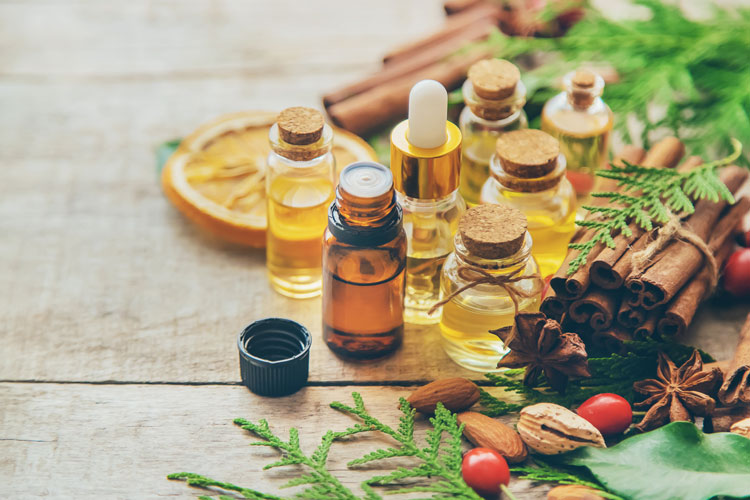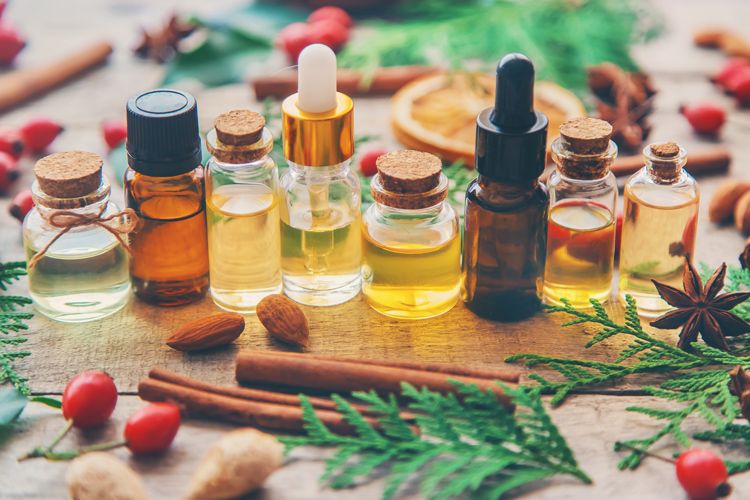Monday Aug 11th, 2025
Many people want to find natural alternatives to chemical cleaners. If you’ve started your search, you’ve likely come across solutions that include essential oils.
There is no doubt they smell great. But do essential oils actually have any disinfectant properties? While the research is limited, Gem City Cleaning Solutions parsed through the literature to see which claims are true, false, and yet to be determined.

Do Essential Oils Work for Cleaning?
According to a massive Italian literature review conducted by the National Research Council of Italy and the University of Salerno, essential oils do have some promising properties. The review highlighted a myriad of essential oils, such as thyme, oregano, clove, and cinnamon, as some of the most potent natural bacteria-fighters.
More specifically, researchers found that essential oils are rich in terpenes, terpenoids, and phenylpropenes, which are organic chemicals with significant antimicrobial properties. That said, they’re most effective at eliminating gram-positive bacteria such as:
- Staphylococcus aureus (can cause skin infections)
- Streptococcus (strep throat)
- Bacillus cereus (sometimes found on food)
The problem is, gram-negative bacteria, which are also common in the home, have an extra outer membrane that makes them more challenging to kill with essential oils. Examples of gram-negative bacteria include:
- E. coli
- Salmonella
- Pseudomonas
However, there are four essential oils that are heavy-hitters against gram-negative bacteria. According to the review, EOs that are effective against these hard-to-fight bacteria include:
- Oregano Oil
- Thyme Oil
- Clove Oil
- Cinnamon Oil
Essential oils may really showcase their strength when cleaning carpets. A study from Japan tested carpet cleaners containing small amounts of three wood-derived essential oils, including hiba wood oil, hinoki cypress oil, and taiwan hinoki oil, to see how well they reduced house dust mites. Even at very low concentrations (0.1%), researchers found a significant reduction in mite activity.

Enhancing the Cleaning Power of Essential Oils
You can combine several natural, non-synthetic chemicals with essential oils to boost their antibacterial power. Many of these work by helping essential oils penetrate bacteria more easily and making the environment less friendly for bacteria to survive. If you’re making your own cleaners, consider combining essential oils with:
- Vinegar: Lowers pH, which makes it harder for bacteria to grow; can dissolve mineral deposits and soap scum, allowing EOs to reach surfaces better.
- Pairs well with: Lemon, tea tree, thyme, and oregano.
- Best use: Glass cleaner, hard surface sprays.
- Alcohol: Breaks down bacterial membranes and acts as a carrier for the essential oil.
- Pairs well with: Clove, cinnamon, oregano, and thyme.
- Best use: Disinfecting sprays and hand sanitizers.
- Baking Soda: Gentle abrasive for scrubbing; shifts pH, which can make bacteria more vulnerable and works as a deodorizer.
- Pairs well with: Lemon, tea tree, and peppermint.
- Best use: Scrubs for sinks, tubs, stovetops.
- Hydrogen Peroxide: Releases oxygen that destroys bacteria and biofilms.
- Pairs well with: Tea tree, lavender, and oregano.
- Best use: Mold removal, cutting board cleaner, fridge cleaner.
- Castile Soap: Breaks down grease and dirt so EOs can work directly on bacteria; fully biodegradable and plant-based.
- Pairs well with: Citrus, mint, and lavender.
- Best use: All-purpose cleaners and floor mopping solutions.
- Citric Acid: Strong acid that dissolves hard water deposits and can destabilize bacterial cell walls.
- Pairs well with: Lemon, orange, and grapefruit oils.
- Best use: Descaling kettles, coffee makers, bathroom cleaners.
Potential Anti-Viral Effects of Essential Oils
Essential oils may be particularly effective during flu season. Researchers from the University of British Columbia have found that some essential oils, notably cinnamon, bergamot, and thyme, in their liquid state, completely inactivate the influenza virus (H1N1).

Essential Oil Cleaners & Your Indoor Air
It’s important to note that while essential oils smell great and are eco-friendly, they can contribute to a reduction in indoor air quality. A recent study found that essential oil-based cleaners release gases, particularly terpenes and formaldehyde, into the air right after cleaning and linger for several hours. Both terpenes and formaldehyde can trigger:
- Skin irritation
- Allergic reactions
- Asthma symptoms
- General respiratory discomfort
Therefore, if you enjoy essential oil-based cleaners but want to limit exposure, ventilate while cleaning and avoid overspraying.
A Cleaner Who Cleans Like You
While essential oils can bring a pleasant fragrance and some antimicrobial benefits to your cleaning routine, they aren’t a perfect one-size-fits-all disinfectant. Research shows that certain oils like oregano, thyme, clove, and cinnamon are particularly effective against some bacteria and potentially against viruses. However, they work best when paired with other natural cleaning agents such as vinegar, alcohol, or hydrogen peroxide.
Used thoughtfully, essential oils can be a part of an eco-conscious cleaning strategy, especially when paired with proper ventilation to reduce airborne irritants.
At Gem City Cleaning Solutions, we believe your home should be cleaned according to your preferences. If you have favorite cleaning products, whether essential oil-based, eco-friendly, or a brand you trust, simply leave them out for our cleaning staff and let us know you’d like us to use them. We’re happy to follow your lead so you can enjoy the peace of mind that comes from knowing your space is cleaned just the way you like it.
If you’re in the Erie, Pennsylvania, area, schedule your next cleaning with Gem City Cleaning Solutions today. Let our team create a fresh, healthy home environment tailored to your needs.
